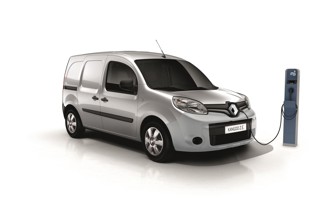The Government has confirmed that fleets will have access to the plug-in van and truck grants for an additional two years, until 2024/25.
The announcement comes after the plug-in car and van grant rates were cut and the eligibility criteria was changed last year.
The Plug-in Car Grant (PiCG), which had given consumers 35% off the purchase price of an EV up to a maximum of £2,500, was cut by £1,000 to £1,500.
The eligibility criteria for the plug-in car grant was also changed. Cars with a recommended retail price (RRP) of £35,000 or less had been eligible, but that was reduced by £3,000 to £32,000 or less.
Furthermore, hybrid electric cars, which had CO2 emission of less than 50g/km and could travel at least 112km (70 miles) without any emissions, were made no longer eligible.
In terms of the Plug-in Van Grant (PiVG), the grant rate for light commercial vehicles (LCVs) was also cut.
For small vans, 2.5 tonnes gross vehicle weight (GVW) or less, the grant had given consumers 35% off the purchase price up to a maximum of £3,000. That was cut to £2,500.
For larger vans, 2-3.5 tonnes GVW, the grant was also reduced, from a maximum of £6,000 to £5,000.
There were no changes to grant rates for vehicles over 3.5 tonnes.
However, alongside announcing the extension to the plug-in van and truck grants, the eligibility criteria for existing plug-in vehicle grants will also be recategorised from the spring with a focus on heavier vehicles.
From April 1, the threshold to claim the small truck grant of up to £16,000 will be increased from 3.5 tonnes to 4.25 tonnes. Vans up to 4.25 tonnes will be able to claim the large van grant of up to £5,000.
The Government says it will continue to allow drivers holding standard car driving licences to drive electric goods vans at a higher weight limit, up to 4.25 tonnes (compared to a 3.5 tonne limit for diesel vans).
With the increasing number of large vans on the market, the move will ensure Government targets support where it’s most needed, allowing for heavier and more costly trucks, up to 12 tonnes, to benefit from the higher grant funding, it said.
Industry figures showed the UK had the highest number of plug-in electric vans sold in Europe, and there were around four times as many grant applications compared to 2020.
Existing grants have supported the purchase of more than 26,000 electric vans and HGVs across the UK since the programme launched in 2012.
With nearly 5% of the UK’s CO2 emissions currently coming from vans, ministers say that the two-year extension to these grants and the switch to greener vehicles is essential to support the Government’s climate change and air quality commitments.
Transport minister Trudy Harrison said: “When it comes to clean business, this Government means business. We are backing a generation of green growth for our thriving fleet sector.
“As demand for electric vehicles continues to grow at speed, this extension to our grant scheme will allow tens of thousands more vans to be purchased, transporting goods in a way which is kinder to our environment.
“This will support our vital, ongoing work to clean up our air in towns and cities right across the country and build back greener.”
Commenting on the news that the Department for Transport (DfT) will make the plug-in available up until 2024/25, BVRLA director of corporate affairs, Toby Poston said: “This good news comes at the perfect time for the fleet industry as it struggles with rising operating costs and global shortage of electric vans.
“The two-year extension on the grant will enable van operators to plan their fleet upgrades with greater confidence.”
Poston explained that the prolonged van grant was a key pillar of the ‘Van Plan’ that the BVRLA launched last year.
“The electric van market continues to lag behind the electric car market and next year was not the time to remove this vital grant,” he continued.
“As the funds available to support the transition to zero emission diminish, we support the Government’s pragmatic steps to focus on sectors that need the most help in the build up to the 2030 phase-out.”
The BVRLA also welcomed today’s clarification on the continued ability of Class B licence holders to drive heavier electric vans up to 4.25 tonnes.
























Login to comment
Comments
No comments have been made yet.